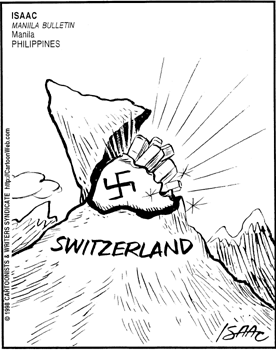|
|

|
|
|

|

Jewish World Review / August, 1998 / Menachem-Av, 5758
The refusal of the Swiss to make a more generous settlement has led many
state and city controllers around the country to campaign for sanctions against
Swiss financial institutions doing business in the U.S. Indeed, in my own
state, State Rep. Lee Samowitz (D-Bridgeport) has urged that Connecticut
enact sanctions of its own, following the lead of New York and Pennsylvania.
Advocates say that such measures can then be used as leverage to make the
Swiss give back more of the stolen Jewish money.
But Stuart Eizenstat, U.S. under secretary of state for economic affairs,
who has devoted enormous energy to the investigation of the role of the Swiss
and other neutrals in the Holocaust and the efforts to force them to make
restitution, has a different point of view. Eizenstat thinks sanctions won't
help in the negotiations and may even hurt.
While I am by no means shy about support of global economic sanctions where
they represent a principled stand against evil (such as human rights
violations and support for terrorism), I think this time Eizenstat and the
Administration are probably right. The negotiations with the Swiss ought not
to be treated as moral warfare.
The Swiss banks and their governments did wrong during the Shoah and were
slow
in admitting to their guilt. They have also not been as forthcoming as we
might have wished in the subsequent negotiations about the disposal of such
funds today. But treating present day Switzerland as if there were no
difference between it and escaped war criminals is a self-defeating tactic.
The Swiss seem to be ready to make amends. The question is how much. And
sanctions and lawsuits will only drag out the issue and make it even more
unlikely that indigent Holocaust survivors will see any of the looted money.
That will not serve justice.
But press conferences and impassioned speeches on this issue do serve the
interests of some in the Jewish world who have latched onto this issue to
promote themselves (though by no means all of those who have worked on this
issue), as well as those politicians who would like to make a little
political
hay out of it too.
I also think it is ironic that the overwhelming media coverage of this issue
in the secular press is unmatched by any interest in the ongoing efforts to
deport and convict Nazi war criminals and collaborators. Recently, I heard
Eli
Rosenbaum, the director of the U.S. Justice Department's Office of Special
Investigations speak about the tough job of tracking down war criminals.
Rosenbaum said his office rarely gets coverage from the mainstream press
these
days, while stories dealing with stolen artwork can command the front page
of
a newspaper like The New York Times. Rosenbaum noted that all of those whose
paintings were stolen by the Nazis would not fill the small university
auditorium in Cleveland where he spoke. Yet, when murderers of thousands are
tried, little ink is expended on that story.
Why is it that such cases are ignored by newspapers like The Times when they
are prepared to devote so much space to looted art and bank accounts?
Justice
should be done in these thefts, but they pale in comparison to the question
of
murdered human beings. Like some Holocaust survivors whom I have spoken to,
I
am troubled by the idea that the murder of millions of Jews is being reduced
to a question of cash and goods which were stolen and now must be returned.
With that in mind, perhaps it is time for many of those who have been
grandstanding on the issue of the Swiss banks to calm down and negotiate
some
 Grandstanding
Grandstanding
on Swiss loot?
The attention paid to Nazi gold and artwork may distort our view of the
Holocaust, says Jonathan Tobin
ARE JEWISH GROUPS ready to go to financial war against Switzerland? That's
the impression we're getting in the aftermath of stalemated talks between Jewish
negotiators and the largest Swiss banks. While the Clinton Administration is
urging caution and continued negotiations, some Jews and many state and
local finance officials in the U.S. are threatening to enact sanctions against
Swiss banks.
 At stake is the amount of money the Swiss will pay to settle claims over
Holocaust-era bank deposits. The ongoing talks between Jewish groups from
around the world and the Swiss government have stalemated over the lost
funds which have enriched the Swiss while many Holocaust survivors are indigent.
Officials of the World Jewish Congress, which helped uncover the fact that
the Swiss took part in the looting of the victims of the Holocaust, and who have
taken the lead in the talks, now say that sanctions on Switzerland are in
order. They have refused the 3 top Swiss banks' offer of a settlement of
$600 million and instead want a "global settlement" of $1.5 billion to cover all
outstanding claims against the Swiss.
At stake is the amount of money the Swiss will pay to settle claims over
Holocaust-era bank deposits. The ongoing talks between Jewish groups from
around the world and the Swiss government have stalemated over the lost
funds which have enriched the Swiss while many Holocaust survivors are indigent.
Officials of the World Jewish Congress, which helped uncover the fact that
the Swiss took part in the looting of the victims of the Holocaust, and who have
taken the lead in the talks, now say that sanctions on Switzerland are in
order. They have refused the 3 top Swiss banks' offer of a settlement of
$600 million and instead want a "global settlement" of $1.5 billion to cover all
outstanding claims against the Swiss.
JWR contributor Jonathan S. Tobin is executive editor of the Connecticut Jewish Ledger. He was
the recipient of the American Jewish Press Association highest award: First
Place in The Louis Rapoport Award for Excellence in Commentary and Editorial
Writing. The Rapoport award is named for the longtime editor of the
Jerusalem Post and was given to Mr. Tobin at the AJPA's 1997 Simon Rockower Awards dinner
in Cleveland on June 18, 1998.